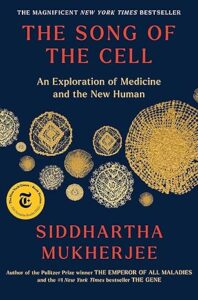The AI turns out to be quite spectacular. Starting with ChatGPT and now moving to agents, reasoning, voice, image and video creation, the technology seems limitless. And now that Elon Musk has figured out how to connect 100,000 Nvidia chips into a high-speed network, the opportunity is only getting bigger.
Among everything we will do with AI (art, music, war, medicine, science, learning), there is a feature That’s what excites me the most. And as a businessman first, and then an analyst, I think that’s where there’s the most potential.
This feature is “interconnectivity”.
For the first time in my adult life, we have technology that can understand the interdependence of information.
 I’ve always thought about systems. Perhaps, because of my scientific background, I always thought that a given problem or question could be better understood if we knew all the associated factors. I read a beautiful book “The Song of the Cell” by Siddhartha Mukherjee, and the interconnectedness of the human body is magical. Each of our cells, in its own complex way, works with its peers to create the magic of life.
I’ve always thought about systems. Perhaps, because of my scientific background, I always thought that a given problem or question could be better understood if we knew all the associated factors. I read a beautiful book “The Song of the Cell” by Siddhartha Mukherjee, and the interconnectedness of the human body is magical. Each of our cells, in its own complex way, works with its peers to create the magic of life.
The companies are the same. In fact, while reading the book, I realized that our companies are not unlike human bodies: individual teams (cells) do things together and then must interconnect, share and coexist with the whole. This systemic idea (at the heart of Systemic HR) is what differentiates high-performing companies from their peers.
I want my HR friends to think about this. Not only are all financial and business processes connected (the supplier who raised their price simply upended your profit on a product, forcing your sellers to cut back, impacting your customer’s brand, for example), but HR essentially operates in this “data soup” every day.
A simple decision like “who to hire” has huge systemic effects throughout your organization. And if we are to make these individual “cellular” decisions well, we need to see how they interconnect with the rest of the system.
Listen to this podcast
If this seems too abstract for you, listen to the following podcast.
After months of working with Galileo™ (which interconnects HR practices surprisingly well) and numerous discussions with vendors, I developed a pragmatic vision for how AI could change the entire talent management process. It explains how an AI agent could interconnect all our talent management processes in a highly systemic way.
Can we trust him? As the financial community discovered (read this part on Black Box vs White Box models), the answer is yes. AI systems, no matter how inexplicable, outperform our own simple models. (Human cells behave surprisingly well even though we don’t fully understand them.)
Over time, I believe we will move away from “recruitment”, “performance management” and “career management” and end up with systemic talent management. So will rewards (we call them systemic rewards), learning (systemic L&D), employee engagement, and much more.
All of these things are interconnected and we’ve always known it. We just never had the tools or data processing to show us the relationships. Now we do.
Listen here, I’d love to hear your feedback.
How to find out more
Join The Josh Bersin Academyfilled with certification courses on all aspects of systemic HR.
Discover Galileo™, the AI assistant for all things HR


